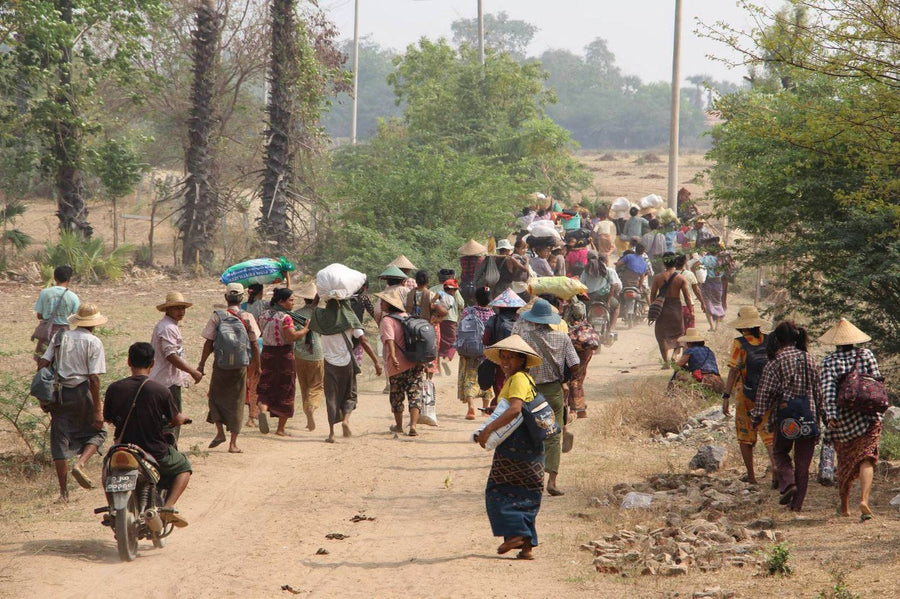Tax included and shipping calculated at checkout

- Posted on
Standing in the Shadows: The Reality of Christian Persecution in Myanmar
When we hear the word “persecution,” it often conjures images of distant lands or past centuries. But in Myanmar today, many believers live under daily threat—caught in the crossfire of civil war, religious nationalism, and state violence. Their stories are painful, their faith is tested, and their perseverance is a witness to many.
A History of Marginalization and Risk
Christian communities in Myanmar are often interwoven with ethnic minority groups such as the Chin, Kachin, and Karen. Historically these groups have faced discrimination not only because of their religion but also because of their ethnicity and their land. As far back as 2007, Christian Solidarity Worldwide documented systemic restrictions on Christians, with the government pressuring religious organizations and constraining Christian activities, sometimes even forcing local leaders to deny that persecution existed.
Following the 2021 military coup, violence intensified across the country. Religious buildings—churches especially—were intentionally targeted in conflict zones. According to the U.S. Commission on International Religious Freedom, over 3.4 million people are displaced within Myanmar, including around 320,000 Christians. These patterns reflect more than collateral damage; they point to a reality where faith status compounds vulnerability.
How Persecution Manifests Today
Christian persecution in Myanmar is not uniform, but certain patterns stand out across the regions most affected. One of the most visible is the destruction of churches and religious sites. The junta and armed forces have carried out airstrikes on churches, especially in Chin State, damaging or destroying many places of worship. In Chin State alone, more than 100 religious buildings—including at least 67 churches—have been destroyed since the 2021 takeover.
Another dimension is forced displacement and denial of aid. Christian communities displaced by warfare often report being deprioritized in humanitarian relief, sometimes repeating the bitter phrase, “no food for Christians.” In conflict zones, religious structures such as churches and chapels are often used as shelters; when those are bombed, believers lose both their spiritual and physical refuge.
Targeted violence and arrests have also become common. Clergy and Christian leaders have been detained, attacked, or killed. The military’s scorched-earth tactics sometimes include burning villages and executing religious leaders. In one instance, a Catholic priest was reportedly killed in the Sagaing region amidst ongoing fighting.
Persecution also takes cultural and social forms. Converts from Buddhist or tribal beliefs often face ostracism or rejection from their families and communities. In some areas, Christians are branded as “outsiders” or treated with suspicion. The narrative is sometimes pushed that to be fully Burmese one must be Buddhist, or at least not openly Christian.
Lives at Risk, Faith in Action
Despite the weight of persecution, there are remarkable stories of courage and resilience. Christian families in conflict zones continue to gather secretly for worship even when their buildings have been destroyed. Pastors open their homes to provide safety and relief to displaced believers. In refugee camps, worship, teaching, and discipleship often continue under extremely difficult conditions, sometimes at great personal cost. Organizations have documented these abuses and raised them before the international community, advocating for accountability and justice. Such everyday acts of faith are powerful testimonies in a world where many would choose to remain silent or flee.
Why This Matters to the Global Church
For the global Church, the situation in Myanmar demands awareness, advocacy, prayer, and tangible support. Many outside the country do not know what is happening, which makes it all the more vital to raise the voices of the silenced. Advocacy through international pressure, sanctions, and diplomatic efforts can help hold perpetrators accountable and send a signal that faith-based violence will not be ignored.
Prayer is another form of action that should not be dismissed as passive. As believers intercede, spiritual strength and unity grow, connecting Christians across borders. Material support also matters—whether through trusted relief agencies, missions, or persecuted-church networks—helping provide food, shelter, medical aid, and trauma care. Finally, solidarity should respect the local culture and leadership, strengthening the church in Myanmar in its own context rather than imposing foreign models.
A Call to Hope and Action
Christian persecution in Myanmar is grim and urgent, yet it is not the final word. The Gospel has always advanced through suffering. If you are reading this, there are concrete ways to respond. Learn and share—accurate and respectful awareness builds a global conscience. Support the persecuted church through trusted channels of relief. Pray deeply for protection, justice, wisdom, and revival in Myanmar. And stand firm in your own context, recognizing that persecution is not always violent; sometimes it is cultural, social, or silent.
May their courage inspire ours. May our prayers join theirs. And may faith, hope, and love prevail—even in the darkest places.
Read more






























